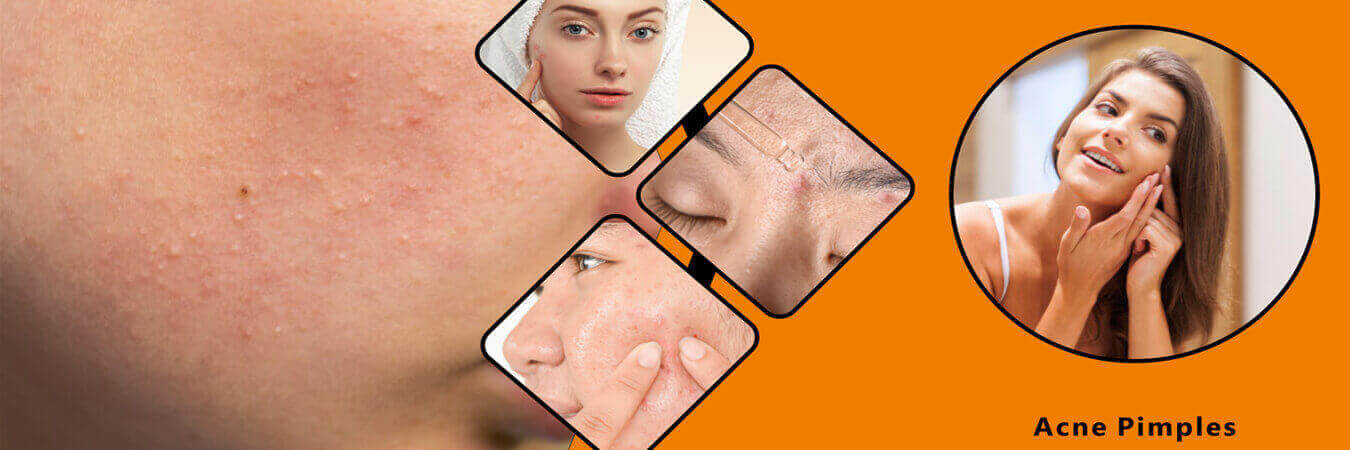


Dr. Reena Jain : Best Acne Specialist in Kota, As you all know acne is a very common skin condition occurring due to blocking of the hair follicles with oil and dead skin cells. This results in the formation of whiteheads, blackheads, red pimples, pustular pimples and sometimes cysts and nodules. It usually affects the body parts rich oil glands like the face, forehead, chest, upper back and shoulders.
It is most common among teenagers and young adults, though it affects people of all ages.
Besides causing aesthetic disfigurement, it can be a major reason for psychological distress too. Depending on its severity, it can cause anxiety, reduced self-esteem, and, in extreme cases, depression, or thoughts of suicide.
The earlier the treatment is started, the lower are the chances of complications.
Acne is a chronic inflammatory skin disease affecting the Pilosebaceous units.
Four main factors are:
1. Excess oil production
2. Clogging of hair follicles by oil and dead skin cells
3. Bacteria
4. Excess activity of androgen hormones
It typically appears on the area which have maximum number of oil (sebaceous) glands like your face, forehead, chest, upper back and shoulders.
Hair follicles are connected to oil glands. The follicle wall bulges forming a whiteheads. If the opening of the hair follicle is big enough, the plugged sebum gets oxidised and turns black in colour, causing a blackheads.
Pimples are raised red spots with a white centre that develop when blocked hair follicles become inflamed or infected with bacteria. Blockages and inflammation that develop deep inside hair follicles produce larger cyst-like lumps beneath the surface of your skin.
Yes! Some of the conditions which can lead to breakouts are:
Family history - A positive family history increases your chances of developing pimples.
♦ Age - Teenagers
♦ Hormonal changes
♦ Certain medications
♦ Friction or pressure on your skin - Due to telephones, cellphones, helmets, tight collars and backpacks, may also precipitate it.
♦ Stress - Stress acts as a precipitating factor
As it arises from the oil glands, the areas which are rich in oil glands have a tendency to develop pimples. The areas include, your face, forehead, chest, upper back and shoulders.
Getting your acne treated is very important, not only because it is causing social embarrassment and cosmetic disfigurement, also because they have a risk of scarring the skin. And once the skin is scarred, it can not be healed completely.
If you are suffering from acne issues, it is highly recommended that for treating acne you consult a qualified dermatologist for its management as soon as possible. There are wide variety of treatment options available which is decided after the consultation. Your dermatologist will assess the type and severity following which they will recommend the prescription medication accordingly.
A combination of different treatment acne medications always gives you the best results.
The various treatment options include:
1. Topical and oral Medications
2. Hormonal Treatment
3. Chemical peels
4. Microdermabrasion
5. Photo facial
6. Carbon facial
7. Laser skin resurfacing for acne scars
8. Routine Skin Care as advised
If you are not taking treatment, then be ready to face its long term complications as well.
Side effects due to acne is very common when a person ignores it as a normal physiological phenomenon thinking it will subside on its own with age and the skin will become perfect again. No mater how mild acne it is, you will always develop its complications if you are not treating it early and actively.
The two most dreaded after effects include:
1. Pigmentation
2. Acne scars
Acne scars are irregularities in the skin surface that are seen as holes or depressions. They can be of various types ranging from mild superficial rolling scars to deep box scars and ice pick scars.
Some people may also develop raised scars which are either hypertrophic scars or keloids.
Acne scars can be improved by a combination of different therapeutic modalities like chemical peels, microdermabrasion, ablative and non-ablative laser skin resurfacing, dermal fillers, and surgical scar revision.
People suffering from acne benefit from using face washes which decreases sebum production. The face should be washed at least twice a day, and if the skin is super oily, one may use the face wash up to four times a day.
Although acne occur more commonly in oily skin, still moisturiser should be used regularly to maintain healthy skin
barrier. There are many scientific studies showing benefit of a moisturiser in acne treatment.
An ideal moisturiser should be non-comedogenic. It should not be greasy and occlusive. It should be gel based and
easily absorbable.
People with acne and especially those who are on some form of treatment, do tend to have photo sensitivity, hence, using a sunscreen is very important.
Physical sunscreens with a minimum SPF of 30 are best suited, as they are broad spectrum and also do not react with the skin.
1. Avoid squeezing, picking or popping the pimples. Popping of pimples increases the risk of complications, so you should avoid picking and popping.
2. Avoid using make up as much as possible. Any form of make up does cause clogging of pores, so make up usage should be limited to only when extremely necessary. More important, do not forget to remove your
make up before sleeping.
3. Avoid leaving oil in your hair and scalp overnight. While you sleep, there are chances that the oil gets transferred to your pillow over which your face is rubbing, and this clog the pores worsening the situation.
4. If you have dandruff in the scalp, kindly get that treated too as dandruff increases the acne both on face as well as on body.
5. Avoid vigorous scrubbing of the face. You may gently exfoliate your skin weekly once.
6. Tea tree oil with Aloe Vera gel can be used as home remedy